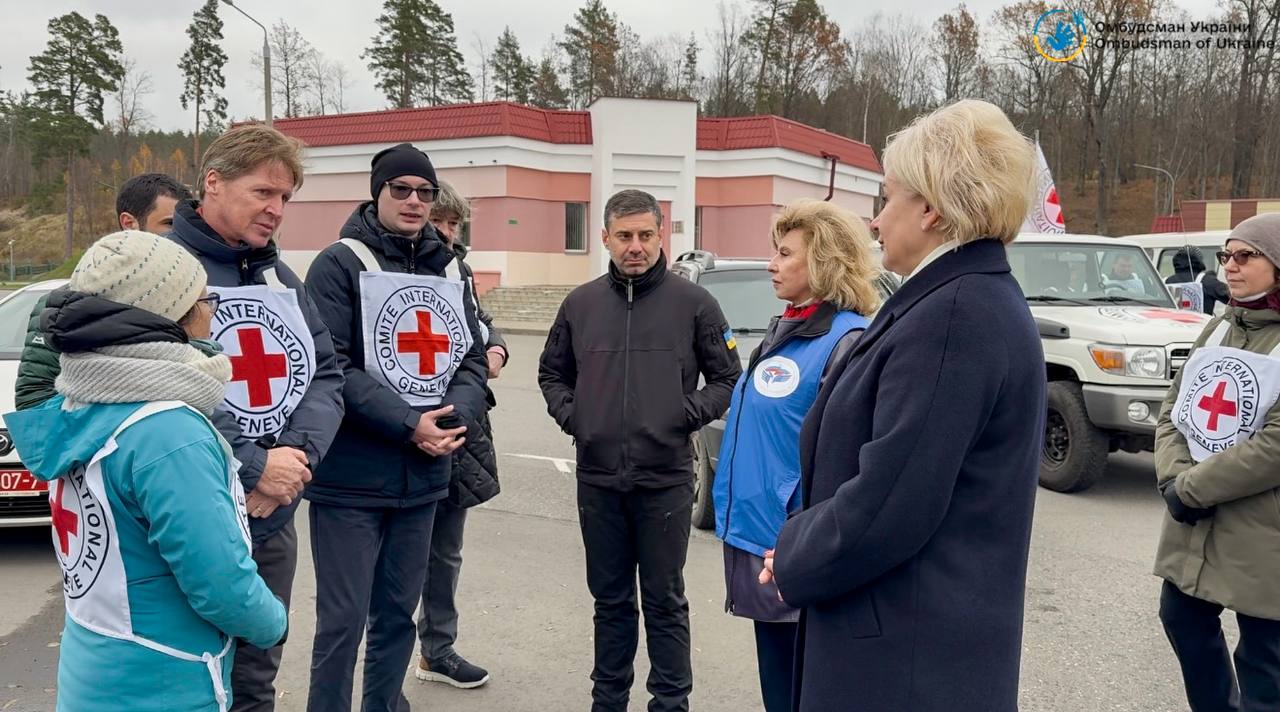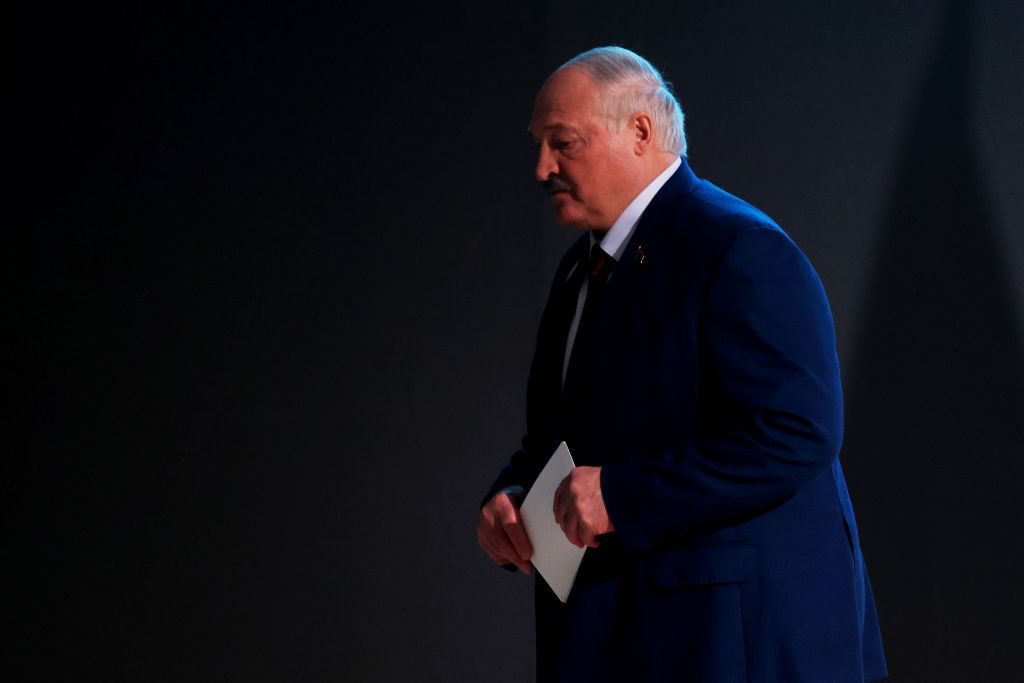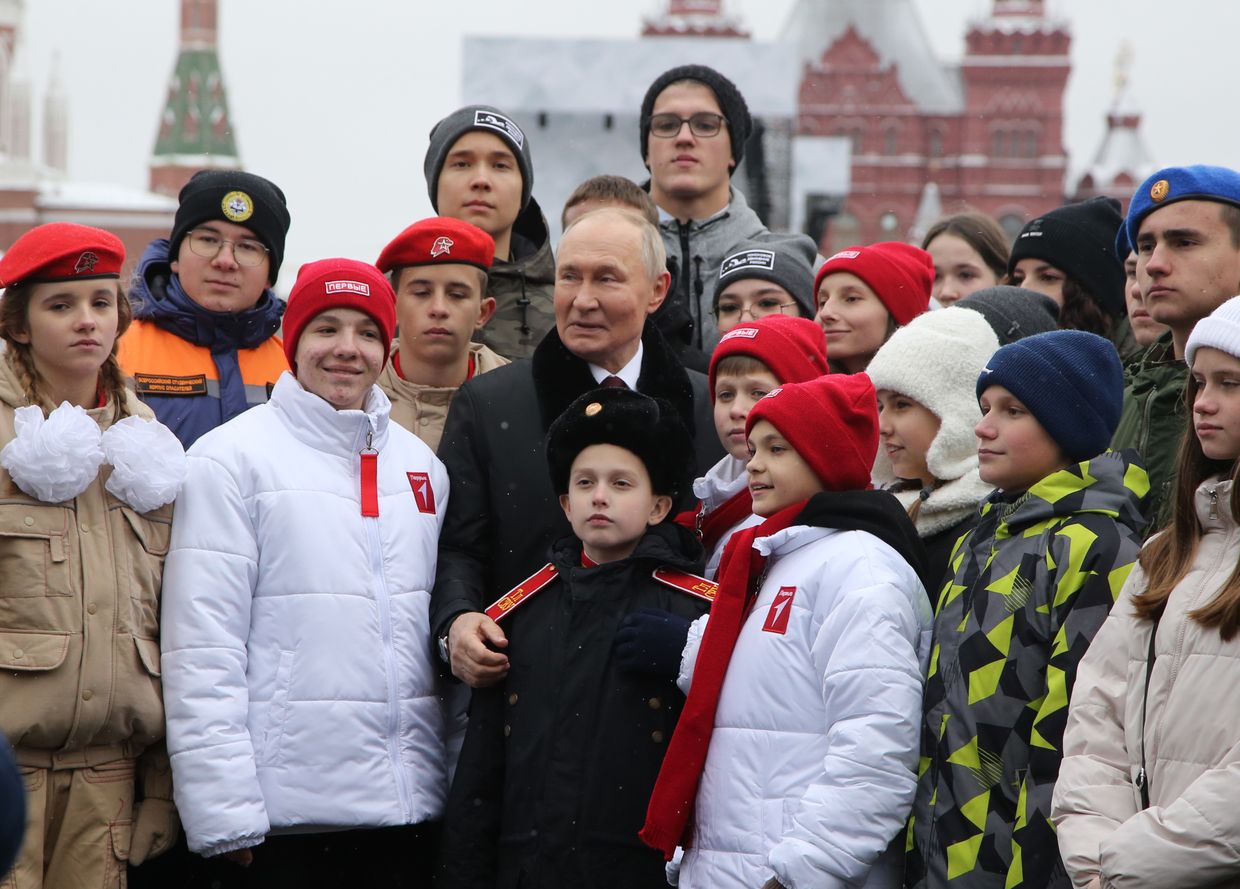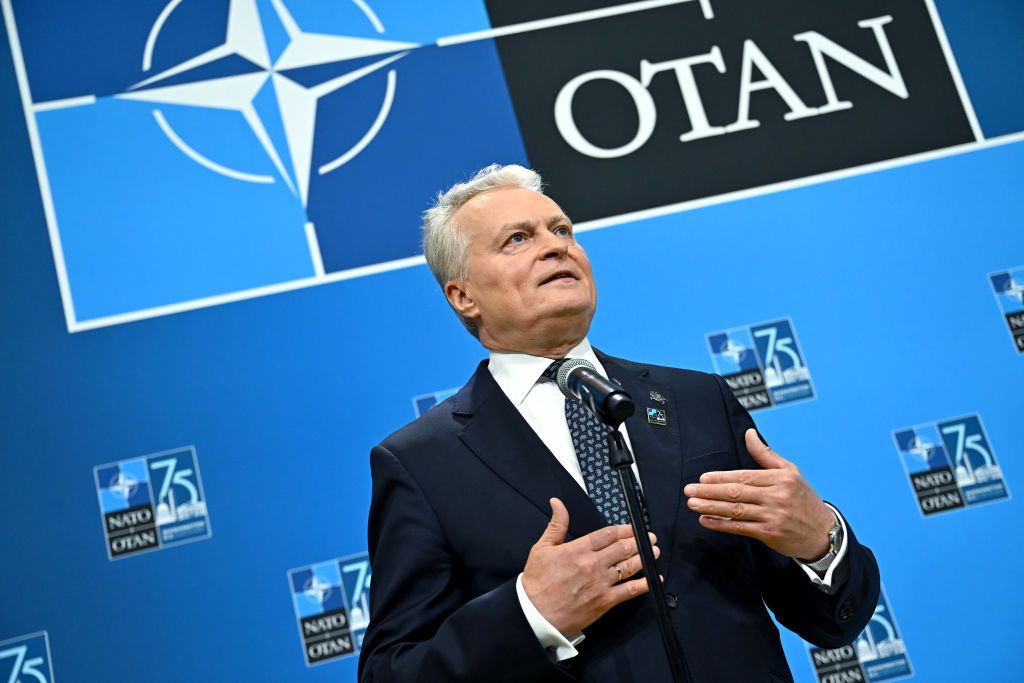
Two of Alexander Lukashenko’s “challengers” in upcoming 2025 presidential elections drop out before race even starts, pledge support for Belarusian dictator.
Lukashenko pardons 31 political prisoners as pre-election police raids intensify.
Lukashenko allows the family to visit Maria Kalesnikava in jail, ending over 600 days of holding the prominent opposition leader incommunicado.
Ukraine, Russia ombudsmen meet in Belarus to exchange fallen soldiers’ bodies, discuss PoW humanitarian issues.
Rights groups push for international backing of Lithuania’s ICC referral over the Lukashenko regime’s abuses.
Two of Lukashenko’s sham election rivals drop out of 2025 presidential election race
Two sham candidates in the 2025 Belarusian presidential elections — Siarhei Bobrykau, Belarusian Union of Officers chair, and former spokeswoman of the Interior Ministry, Olga Chemodanova — said on Nov. 12 that they were dropping out of the race and endorsing incumbent Belarusian dictator Alexander Lukashenko.
The first presidential election in Belarus since the contested 2020 elections, which sent the country into an unresolved political crisis, is scheduled for Jan. 26, 2025. The regime-controlled Central Elections Committee allowed six token candidates to challenge Lukashenko.
Bobrykau justified his decision by saying he wanted to “ensure the cohesion of the officer corps, and to prevent the military ‘being in two minds’ about supporting the current head of state and our leader.”

Chemodanova withdrew and similarly endorsed Lukashenko, saying that she, like other candidates, would form a “reliable rear” for him.
The monitoring campaign organized by the Belarusian Helsinki Committee and Viasna Human Rights Center said in a statement that “such statements by fake presidential candidates are only to be expected, since they cannot exercise their right to participate in the country’s governance.”
The candidates dropped out without even starting to collect the signatures in their support, roughly a week after the Central Elections Committee registered initiative groups to support their candidacies.
The remaining registered candidates, Lukashenko himself and four loyalists — Anna Kanapatskaya, a sham candidate who took part in the 2020 presidential campaign; Siarhei Syrankou, the leader of the Communist Party of Belarus; Aleh Haidukevich, the leader of the pro-Lukashenko Liberal Democratic Party; and Alexander Hizhnyak, the leader of the Republican Party — have until Dec. 6 to gather over 100,000 signatures for their candidates in order to get on the ballot.
Lukashenko is seeking a seventh consecutive term in office after over four years of brutal crackdowns on civil society that have eliminated 1,700 non-profit organizations, outlawed all but four loyal political parties, and jailed Lukashenko’s main political opponents along with around 1,300 people who are now considered to be political prisoners.
The new electoral cycle unfolds while repression continues to haunt those who signed for alternative candidates in the 2020 elections, along with police raids, searches and arrests of people who took part in public protests.

31 political prisoners pardoned in Belarus amid sweeping police raids
Belarusian dictator Alexander Lukashenko has pardoned 31 political prisoners convicted on charges of “extremist activities” — even as police raids sweep the country ahead of presidential elections scheduled for Jan. 26, 2025.
Two women and 29 men were released, although their criminal records were not expunged, leaving them under strict control of the Internal Affairs Ministry, Lukashenko’s press office said on Nov. 7, without disclosing the names of those pardoned.
Three of the pardoned prisoners reportedly have disabilities, and 17 have chronic diseases.
Human Rights activists in Belarus report that prisoners had been deprived of timely and adequate medical help and suffered harsh detention conditions while in prison.
This is the fifth round of pardons since July 2024, bringing the total number of pardoned individuals to 146. Even so, nearly 1,300 political prisoners remain behind bars, and over the same period, Human Rights Group Viasna recognized 205 more individuals as having been jailed on politically motivated charges.
The release also coincided with nationwide police raids. Viasna reports that over 100 people, including 2020 protest participants, have been targeted since Oct. 31, which activists see as an intimidation effort ahead of Jan. 26, 2025 presidential elections. This will be the first presidential election since the 2020 mass public protests over the last poll, which was deemed not free or fair by the international community.
The contested presidential elections in Belarus in 2020 and subsequent nationwide protests sparked an unprecedented crackdown on civil society. Independent media and all but four regime-loyal political parties were eliminated, and Lukashenko regime opponents were jailed or forced into exile.
Seven political prisoners have died in custody.
Lukashenko allows family to visit opposition leader Maria Kalesnikava for the first time since her hospitalization in 2022
The father of prominent opposition figure Maria Kalesnikava has been allowed to visit her in a penal facility, breaking over 600 days of her being held in an incommunicado regime.
Photos of the meeting were posted on Nov. 12 by former opposition blogger Raman Pratasievich, who was captured by Minsk in the forced landing of a commercial flight in 2021.
He has since become a propagandist for the Lukashenko regime.
Former political prisoners recognized the location in which the pictures were taken as the prison hospital, the independent news outlet Nasha Niva.
It remains unknown whether Kalesnikava is undergoing treatment or was delivered to the facility from solitary confinement where she is reportedly held. Nasha Niva also claims video footage of Kalesnikava is to be aired on Friday, Nov. 15.
Kalesnikava, who led presidential candidate Viktar Babaryka’s campaign in 2020, was sentenced to 11 years in prison. In November 2022, she was taken to a prison hospital intensive care unit with a severe medical condition that had developed while she was in detention.
Following a brief visit by her father after that hospitalization, Kalesnikava’s family was unable to contact her for over 600 days. Incommunicado regimes were imposed on Kalesnikava as well as several other high-profile political prisoners, such as former presidential candidates Viktar Babaryka and Siarhei Tsikhanouskiy, veteran politician Mikalai Statkevich, and RFE/RL correspondent Ihar Losik.
Members of Kalesnikava’s family, who are actively seeking her release, say they were concerned for her life, and that prison food was unsuitable for her condition.
The family visit comes after BBC correspondent Steven Rosenberg questioned Lukashenko on Oct. 23 about Kalesnikava’s condition. In response, Lukashenko declared he was ready to consider Kalesnikava’s plea for a pardon. He claimed her family hadn’t been granted visits because “they didn’t want to visit her.”
Ukraine, Russia ombudsmen meet in Belarus to discuss humanitarian issues of war
Ukrainian Human Rights Ombudsman Dmytro Lubinets and his Russian counterpart, Tatyana Moskalkova, met in Minsk on Nov. 8, to exchange lists of prisoners and letters from Ukrainian relatives to Ukrainian prisoners of war, and to discuss humanitarian issues amid Russia’s full-scale war against Ukraine.
The meeting in Belarus, a co-aggressor state in Russia’s war against Ukraine, is thought to be the first since March 2022. While Belarus provided its territory for Russia’s offensive in February 2022, it has also been part of several Ukraine-Russia POW swaps.
During the meeting on Nov. 8, the parties also mutually repatriated the bodies of fallen soldiers. Kyiv received 563 bodies, while Russia received 37. One family was also reunited as a result of the meeting.
“I emphasize that I interacted with the Russian ombudsman to resolve humanitarian issues, return Ukrainians home, and obtain information about our citizens in Russia,” Lubinets said after the meeting.
The International Committee of the Red Cross also participated in the talks.
After supporting the Russian war against Ukraine, Belarus took part in exchanging 103 Russian prisoners of war from Ukraine in September, and another 95 in October.
Earlier, in July, the Lukashenko regime also released five Ukrainian citizens imprisoned in Belarus on politically motivated grounds as part of a Russia-Ukraine prisoner swap. Lukashenko claimed he had released a prisoner accused of a sabotage attack on a Russian radar and control aircraft in Belarus at the request of Russian President Vladimir Putin. The Ukrainian prisoner was exchanged for Metropolitan Jonathan of the Ukrainian Orthodox Church of the Moscow Patriarchate, who had been sentenced to five years in prison for justifying, recognizing as legitimate Russia’s war against Ukraine.
Aiding Russia’s efforts to gain the release of a convicted Russian assassin, Vadim Krasikov, Belarusian dictator Lukashenko pardoned German citizen Rico Krieger, who had been sentenced in Belarus to capital punishment for espionage, and returned him as part of a historic East-West prisoner swap in early August 2024.
12 human rights organizations urge states to support Lithuania’s ICC referral against Lukashenko

The International Federation for Human Rights (FIDH), the Norwegian Helsinki Committee, the Viasna Human Rights Center of Belarus, and nine other human rights organizations have called on state parties to the Rome Statute to endorse Lithuania’s request to the International Criminal Court (ICC) to investigate the Belarusian authorities’ alleged crimes against humanity.
In the open letter published on Nov. 4, the civil society organizations urged ICC state parties to “strengthen” Lithuania’s referral and “send a united message” to the Belarusian regime that “the international community will not tolerate impunity for such crimes.”
The International Accountability Platform for Belarus (IAPB), one of the organizations that signed the letter, reports that residents of Belarus have now sought exile in over 25 ICC State Parties, as well as at least 10 other States that have not ratified the Rome Statute.
Lithuania, which became home to Belarus’s exiled opposition and 60,000 of the Belarusian diaspora in the aftermath of Lukashenko’s brutal crackdown on dissent in 2020, on Sept. 30 formally requested that the ICC investigate the Belarusian regime for its alleged crimes against humanity.
The Lithuanian authorities maintain that by carrying out mass repression, Lukashenko’s regime has forced hundreds of thousands of Belarusians to flee the country and settle in neighboring states — which may constitute the crime of mass deportation.
According to a UN special rapporteur’s March 2024 report, around 300,000 Belarusian citizens have fled the country of under 10 million for fear of persecution.
Despite Belarus not being a party to the Rome Statute, the ICC has jurisdiction due to the alleged crimes being committed on participating nations’ territories. The ICC prosecutor general confirmed the receipt of the referral, claiming that a preliminary examination of the request is due, and its results will determine whether an investigation will be opened.
